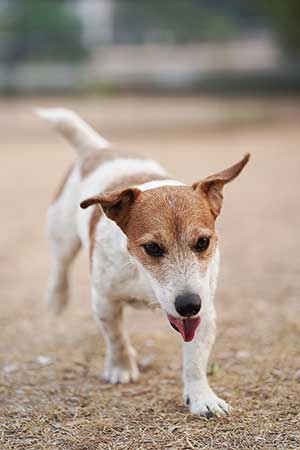As we age we often develop more health concerns, and require aids and adjustments to our lives and homes to make life easier for us. Similarly aging animals can become more symptomatic as they enter their senior years, and they too require certain aids, lifestyle adjustments and more assistance from us their owners and caretakers. Our precious pets give us so much of themselves throughout their lives, so when the time comes that they require more help, we need to be able to provide it for them.
As we age we often develop more health concerns, and require aids and adjustments to our lives and homes to make life easier for us. Similarly aging animals can become more symptomatic as they enter their senior years, and they too require certain aids, lifestyle adjustments and more assistance from us their owners and caretakers. Our precious pets give us so much of themselves throughout their lives, so when the time comes that they require more help, we need to be able to provide it for them.
How to Help Our Senior Pets at Home as they Age
 Nothing replaces regular veterinary visits to diagnose and treat underlying concerns that are often blamed on ‘Old Age’, but actually are issues that have diagnoses and spe-cific therapies. Most of the time there are things that can be done to help, wether by prescribing medications, supplements, special diets and nutrition.
Nothing replaces regular veterinary visits to diagnose and treat underlying concerns that are often blamed on ‘Old Age’, but actually are issues that have diagnoses and spe-cific therapies. Most of the time there are things that can be done to help, wether by prescribing medications, supplements, special diets and nutrition.
Below are some suggestions to improve the quality of life of our elderly pets, and make their senior years more comfortable and fulfilling.
Managing Orthopedic Issues in Senior Pets
Orthopedic issues: Many elderly cats, dogs, birds and other pets develop painful mus-culoskeletal diseases that affect their ability to get around, to stand up, get to the door to ask to go out, reach their litter boxes in cats, or to reach their feeding area. Our job is to help them have easy access to their food, water, toys, favorite room, sleep and elimi-nation areas.
Keep their food, water, and bed closer together so they do not have to go too far to get there. Use pet ramps or stairs to help them get on and off the bed, onto furniture, their favorite spot, or to climb into the car. Place nonslip surfaces on the pathways they use to help with traction, like non slip rugs, carpets or runners. Apply non slip dog shoes, pads, or nail grips which can also prevent them slipping when they have weakness in their limbs. Provide baby gates at the top or bottom of stairs to prevent them from fol-lowing you all the time and hurting themselves by doing that. Place extra litter boxes for cats so they do not have to walk as far to go to the bathroom. Lower the sides of the lit-ter box or get lower edged litter boxes to allow them to get in and out easier. Get extra padding for their beds, or purchase special orthopedic beds to make them more com-fortable. An extra blanket or bed in the car does the same thing. Lower or raise their wa-ter and food bowls so as to alleviate any discomfort in their necks from spinal disease, when eating or drinking.
Supporting Vision and Hearing Loss in Aging Pets
Vision and hearing issues: Aging animals can have decreased vision from a variety of conditions like nuclear sclerosis (cloudy lenses), cataracts, pigment over their eyes, Dia-betes, or other degenerative diseases of the eyes or nervous system. Hardness of hear-ing and deafness can occur and can result in difficulty in knowing what is going on. This can also all be complicated by cognitive issues (senility).
Keep a night light on to help them see their way in the dark. If they usually sleep on your bed, place extra padding or extra cushions around your bed on the floor, as many ani-mals simply fall off the bed as they cannot see the edge anymore in the dark, and can seriously hurt themselves, including neck, spine and head injuries. Changing their bed to the floor next to your bed may have to be done. Many pets with cataracts will see a bright dazzle when walking towards a light or the sun, and they will seem uncomforta-ble from this. Walk away from the light source as much as possible, or cover the light with your hand or an object to alleviate this. Make a clear path for them to and from their most important spots, so it is easy for them to navigate around. In addition do not change the layout of your home too drastically as they may not be able to navigate around the new pattern of furniture. Sign language can be used if their hearing is going but vision is still OK. For those with both hearing and vision deficits, using a scent on your hands to attract them in a certain direction helps, or tapping the floor with your feet to tell them you are there, or picking them up to move them around, are useful aids to know.
Coping with Incontinence in Senior Pets
Bowel and Bladder issues: There are multiple reasons for incontinence, (leaking of stool or urine, or inappropriately urinating or defecating). Provide additional waterproof co-vers or blankets in strategic areas to protect your furniture and home. Some may need special pet diapers to prevent them soiling these areas. Change the di-aper frequently so as not to cause skin irritation from exposure to urine or feces for long periods. There are several drugs and supplements that can help many of these cases, so make sure to discuss this with your veterinarian. Please do not reprimand them if they have ‘accidents’ in the house as they can’t help it. This is a sign that they require help and perhaps a visit to the veterinarian.
Senior birds may need their food and water placed nearer to them so they can access it easier. They may need additional perches, platforms and even stairs to help them get around their cages or play areas better (be creative). If they start getting soiled with stool on their feathers, body or feet, a light soak in a shallow sink to gently remove the matter may be needed. Be careful not to fully submerge your bird, and do not submerge the head.
Dental Care for Senior Pets
Dental issues: Dental disease can be painful and often elderly animals have missing teeth or have teeth extracted by the veterinarian when indicated. Softer food may help them, or adding water to their dry food to soften it. Always ask your veterinarian if a dental procedure is needed, or if painkillers or antibiotics are required to make them feel better.
What we are trying to accomplish here is to do ANYTHING WE CAN to make our pets lives easier and more comfortable as they age. It does take a little thought, planning and effort, but the reward is knowing that your sweet and beloved pets will be happier, more comfortable, more confident and more relaxed in their senior years, and perhaps will even live longer lives due to taking these important steps.
Providing optimal care for your aging pet requires a combination of home adjustments and professional veterinary support. Our Boca Raton veterinarians offers comprehensive geriatric care to help your senior pet thrive. Schedule a pet wellness exam to address your pet's specific needs and create a personalized care plan.
Our 24-hour veterinary clinic is dedicated to improving the quality of life for senior pets. Our experienced team provide compassionate senior pet care, including pain management, nutritional guidance, and behavioral support. Let us help you navigate the challenges of pet aging and ensure your furry friend enjoys their golden years.
